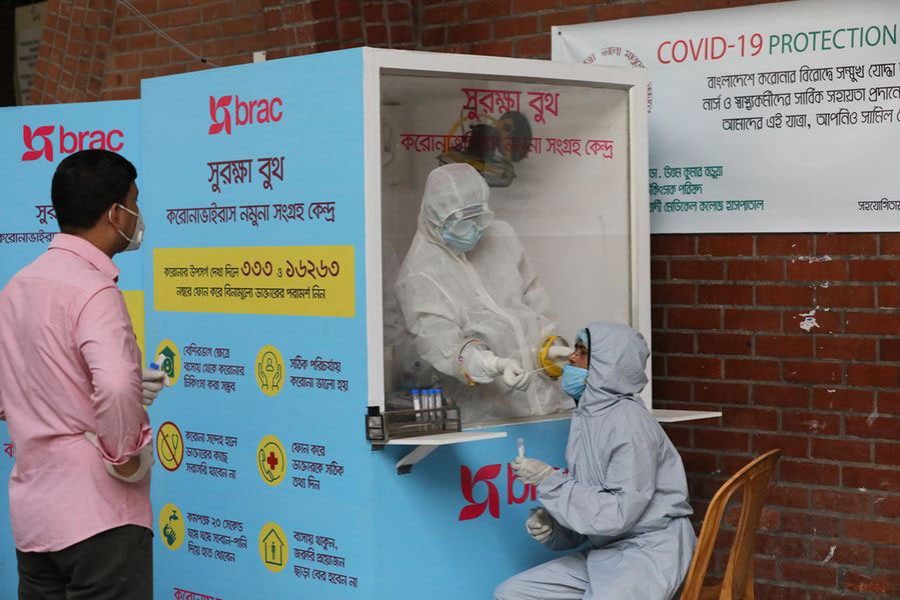Public health experts in Bangladesh have expressed concern about the government's decision to charge people for Covid-19 tests amid a sharp decline in the number of tests being done. In late June, the government decided to charge Tk 200 (£1·80) for testing done at government facilities and Tk 500 for samples collected from home to "avoid unnecessary tests". The private sector charges Tk 3500 per test. Almost one in four Bangladeshis live below the national poverty line.
Since the decision, testing rates have fallen to around 0·8 tests per 1000 people per day, with a low of just 0·06 tests per 1000 people in August. Bangladesh is administering on average between 12000 and 15,000 tests per day for a population of 168 million, and has recorded almost 275,000 confirmed cases and more than 3600 deaths.
Shamim Talukder, head of Eminence, a Bangladeshi public health research organisation, told The Lancet that the pandemic had exposed the country's "unethical" health-care system. "From the beginning of the pandemic, the government wanted to control the Covid-19 testing system", he said. "At the beginning it didn't allow the private sector to do the tests and now they've applied a charge for testing in the public sector, which just means that the poor are excluded."
Talukder told The Lancet that he had visited multiple graveyards across Dhaka, where graveyard managers had told him the death rate from Covid-19 was "four times higher" than the recorded figure was. Many people, he said, had died of Covid-19 but had not been tested, or had died before they had received their test results.
Former Director of Bangladesh's Institute of Epidemiology, Disease Control and Research, Mahmudur Rahman, condemned the government's decision. "Charging people for tests is really creating problems; it is creating barriers, especially for the poor", he said. "During the pandemic, people do not have work, they do not have money, they're at a huge disadvantage...Governments should not charge anyone for testing."
Other barriers to testing, Rahman said, include the low trust people had in the health-care system. "We've had testing scams here. There is a lack of confidence in the health-care system, so people don't want to get tested because they don't want to get a result they don't trust", he said. "Another problem is the delay in getting the results- sometimes it takes a week, other times it just doesn't come. If someone needs a result immediately, why bother? They just stay at home instead."
In mid-July a Bangladesh hospital owner was arrested over allegations he issued thousands of fake negative Covid-19 test results, further shining a light on the country's unregulated private sector. Rahman called for the country to urgently set up a sentinel surveillance system, as in 2009 in response to the H1N1 influenza pandemic, which would enable a better understanding of the virus at the community level to see where the infection was moving and to plan accordingly. "This sort of surveillance is crucial. If people are not coming for testing, then there has to be a mechanism in place so we can under- stand the situation of our country."
A doctor in Dhaka, who spoke to The Lancet on the condition of anonymity, feared what was coming.
"In a country of more than 165 million, that is performing a maximum of 15,000 tests per day, it is nothing and largely those tests are just being done in Dhaka itself", he said. "This plague will stay for quite a long time. What I'm afraid of is when the Bangladeshi winter arrives. People are afraid."
Talukder said that the pandemic had further exposed the country's failing health-care system, which spends just 0·69 per cent of the country's Gross Domestic Product on health, making Bangladesh one of the lowest spenders on health globally. Moreover, two-thirds of health expenditure is out of pocket and borne by households, many of whom are propelled into poverty by catastrophic health-care costs.
Talukder called for a complete restructuring of the health-care system, which would include banning doctors who work in the public sector from supplementing their income with private practice, which has led to the neglect of patients in public facilities, among other interventions. "Most people do not like to go to the hospital due to the poor quality of services and they do not want to go to the private sector because of the high price", he said.
With Bangladesh in the grip of the monsoon season and the dengue season approaching, all three experts expressed concern about Covid-19 continuing to spread unchecked throughout the country. They feared that the worst was yet to come. "The government's priority is the economy, [but] Covid-19 will continue to spread into rural areas and more people will die", Talukder said.
The ministry of health did not respond to The Lancet's request for comment.
[Source: www.thelancet.com
(Vol 396, August 29, 2020)]


